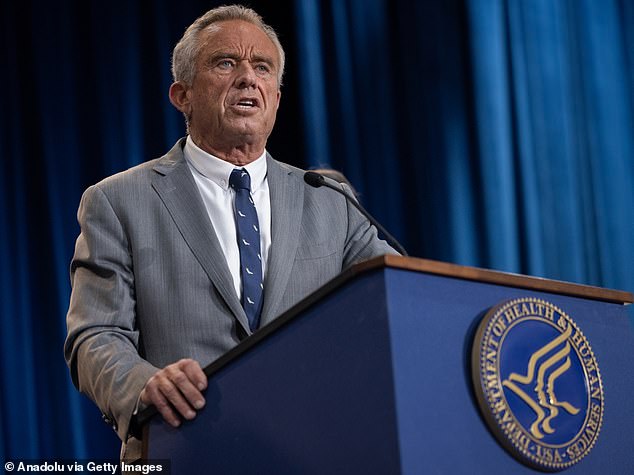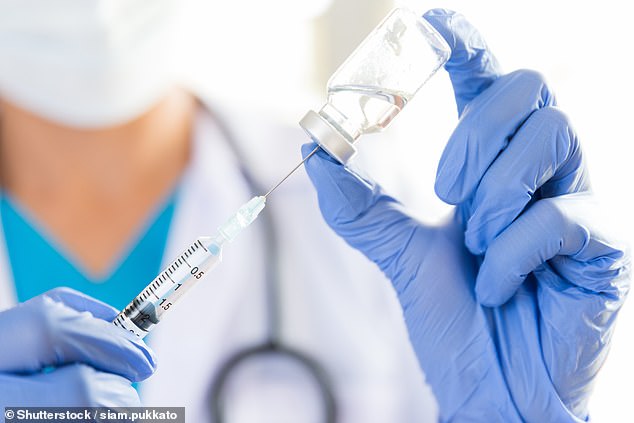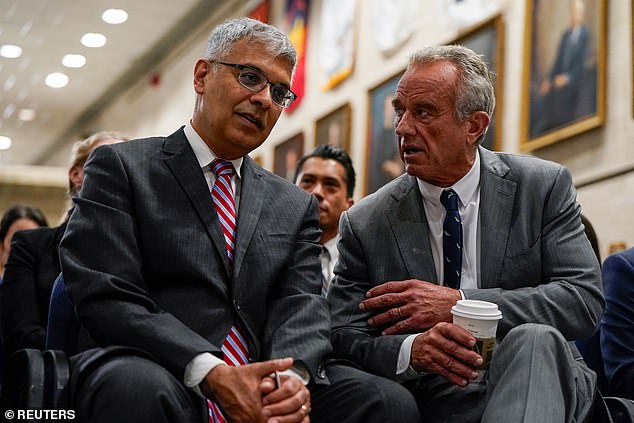Trump Unveils Bombshell Vaccine Shift That Experts Fear Could Upend Plans
- READ MORE: RFK Jr's shocking U-turn on MMR vaccine amid measles outbreak
The Trump administration has unveiled two significant vaccine strategies in an attempt to enhance security and decrease the amount of injections administered to Americans .
The Department of Health and Human Services (HHS) has decided that all newly developed vaccines must undergo testing in placebo-controlled trials prior to receiving approval for usage.
This means some people in the study will receive the vaccine while others receive a benign substance such as saline before the results are compared.
Robert F. Kennedy, the head of HHS, stated that this step would enhance public confidence in vaccinations and improve openness. However, certain specialists worry it might result in unscrupulous actions.
While vaccines for new diseases are often tested with placebos, they are not used for shots for existing, treatable pathogens like the measles and polio viruses. Experts say it's unethical to knowingly expose unprotected people to a curable illness.
In the meantime, the HHS unveiled a new $500 million initiative aimed at developing vaccines capable of protecting against multiple virus strains with just one dose.
The ‘universal’ vaccines , slated to be FDA-approved by 2029 at the earliest, is aimed at reducing the need for boosters every year for diseases like Covid.
The latest initiative is consistent with Kennedy’s previous statements suggesting that 'No other nation administers as many vaccinations to children during their first year of life as the United States' and 'We are administering numerous vaccines to kids, many of which may be unnecessary.'

The platform will be supported by the US government’s Biomedical Advanced Research and Development Authority (BARDA) and the National Institutes of Health (NIH), with no involvement from the private sector.
RFK Jr has often accused government health agencies of collaborating with Big Pharma to develop profitable drugs that serve no real necessity, and vowed upon taking office, to curtail the industry's involvement in government health and science initiatives, such as vaccine development.
The project will initially focus on universal flu and Covid vaccines , targeting two specific candidates: the BPL-1357 flu shot, currently awaiting Phase 2 trials, and the universal BPL-24910 Covid vaccine, which is about to enter Phase 1 trials.
The development of a universal vaccine is being led by two newly designated senior researchers at the NIH, Drs Matthew Memolo and Jeffery Taubenberger.
A universal Covid or flu vaccine could significantly reduce the number of needed compared to current vaccination strategies .
Although individuals typically receive an annual flu vaccination, the allure of a universal vaccine lies in its potential to provide prolonged immunity against multiple strains, thereby eliminating the necessity for yearly shots.
Additionally, people generally need two doses of a Covid vaccine and regularly boosters every year.
A comprehensive COVID-19 vaccine could eliminate booster shots, replacing them with just one dose approximately every five years. saving people from being jabbed around 15 additional times over a decade .
The technology underpinning the universal vaccines is the BPL platform, which chemically inactivates whole viruses, preserving multiple viral proteins (not just one, like the spike protein on Covid).
These vaccines are probably more secure for people with weakened immune systems compared to live-attenuated vaccines since they do not replicate or lead to infections.
By maintaining several viral proteins, these vaccines might elicit more robust T-cell reactions than subunit or mRNA vaccines, potentially providing wider and longer-lasting immunity.
As stated by HHS, the vaccine technology 'is entirely owned by the government and developed by NIH.'
'This method guarantees complete openness, civic oversight, and independence from business-related biases.'

Touting its goal of providing the public with full transparency, an HHS spokesperson said that requiring that all new vaccines undergo placebo-controlled trials - in which one study population receives a shot not containing the vaccine, calling it, 'a radical departure from past practices.'
Many vaccines have been evaluated using this method; however, experts contend that it is not effective—potentially being unethical as well—for well-established vaccines such as those for measles and polio. Denying known protection to the placebo group could expose these individuals to an avoidable threat of a fatal disease.
RFK Jr is not the initial public health officer to advocate for the creation of a universal influenza vaccine. For approximately 15 years, the National Institutes of Health (NIH) have supported initiatives aimed at developing such a vaccine, with one project led by Dr. Taubenberger laying down critical technological foundations; nonetheless, achieving this objective continues to be challenging.
The HHS statement regarding the new initiative indicates that clinical trials for a universal flu vaccine will not start for a minimum of one more year, The earliest anticipated approval date for both universal flu and COVID-19 vaccines is projected to be around 2029.
The timeline far exceeds that of the highly effective vaccines for Covid, which were developed by pharmaceutical giants Pfizer, Moderna, and J&J. Development began in 2020, and they were deemed safe and effective by the FDA in December of the same year.
RFK Jr previously made a deceptive assertion that this accelerated schedule entailed compromising thorough safety tests.
The steps during safety trials were not omitted but conducted concurrently. Various trial phases occurred at the same time as researchers continually examined the data.
The project progressed more swiftly due to unrestricted financing, worldwide enrollment of myriad participants, and instantaneous data assessment devoid of administrative delays.

The newest version of the Gold Standard platform will be more in line with the conventional timeline for vaccine development.
Preclinical studies and Phase 1 clinical trials typically last around two years, whereas Phases 2 through 4 may require as long as four additional years.
However, once these universal vaccines become available, tens of thousands of lives could potentially be saved. In 2019, scientists from leading U.S. academic institutions calculated that a comprehensive flu vaccine would prevent 5.3 million infections , 81,000 hospitalizations, and 6,300 fatalities due to influenza in the United States annually.
This might help the U.S. healthcare system save approximately $1.1 billion each year when compared to the period before Covid-19 flu seasons.
The NIH Director, Dr. Jay Bhattacharya, stated: "Generation Gold Standard represents a significant change in approach."
‘It extends vaccine protection beyond strain-specific limits and prepares for flu viral threats – not just today’s, but tomorrow’s as well – using traditional vaccine technology brought into the 21st century.’
This significant financial commitment comes amid widespread efforts across all levels of government to reduce expenditures. More than 800 research grants from the NIH have been rescinded. It’s anticipated that approximately 20,000 staff members at HHS have lost their jobs, with roughly 1,200 being NIH scientists.
Read more
Post a Comment for "Trump Unveils Bombshell Vaccine Shift That Experts Fear Could Upend Plans"